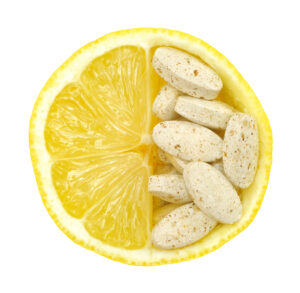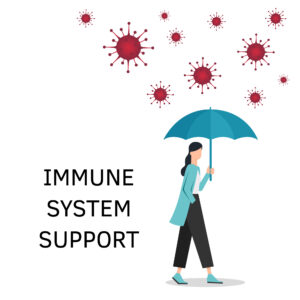A Holistic Approach Is Best
Author: Dr. Stephen Chaney
 Cold and flu season is here. And if you have children, that’s not good news. Children and adolescents are particularly susceptible to respiratory infections (colds, sore throat, sinusitis, pneumonia, and bronchitis). That’s because:
Cold and flu season is here. And if you have children, that’s not good news. Children and adolescents are particularly susceptible to respiratory infections (colds, sore throat, sinusitis, pneumonia, and bronchitis). That’s because:
- Their immune systems are immature.
- Their diet and sleep patterns are far from optimal.
- Increasing environmental pollution makes the problem worse.
And that’s a problem. The WHO says:
- Respiratory diseases are the leading cause of childhood deaths globally.
- RSV alone results in 3.6 million hospitalizations and 100,000 deaths each year.
The death rates are not as high in the US, but every day your child is sick at home:
- They are not in school leaning.
- One parent has to stay home from their job to take care of them.
If you want to protect your child from respiratory infections and do it naturally, you need to strengthen their immune system. And that requires a holistic approach which I have described in a previous issue of “Health Tips From The Professor”.
But ever since Dr. Linus Pauling published “Vitamin C and the Common Cold” in 1970, there has been a lot of discussion about the role of vitamin C in preventing respiratory infections. I don’t need to tell you this has been a controversial topic.
Several recent studies have confirmed the role of vitamin C in preventing and shortening respiratory infections in adults, and this did not require the mega-dose levels recommended by Dr. Pauling.
However, high-quality studies on the role of preventing respiratory infections in children and adolescents are lacking. The study (C Li et al, Frontiers in Nutrition, 12:1601218, 2025) I will describe today was designed to fill this gap.
How Was This Study Done?
 The authors of this study used data from the 2017-2018 National Health and Nutrition Examination Survey (NHANES) in the United States. The NHANES study included 8,704 people, of which 1,344 were children or adolescents aged 6-19 years old.
The authors of this study used data from the 2017-2018 National Health and Nutrition Examination Survey (NHANES) in the United States. The NHANES study included 8,704 people, of which 1,344 were children or adolescents aged 6-19 years old.
At the time of enrollment:
- Serum levels of vitamin C were determined by laboratory analysis.
- The incidence of recent (within 30 days) respiratory infections was determined from a self-reported health questionnaire. In this study the most frequent respiratory infection was the common cold. But the term respiratory infections also included sore throats, sinusitis, pneumonia, and bronchitis.
Of the 1,344 participants, 238 (17.7%) reported a respiratory infection within the past 30 days.
The participants were divided into quartiles based on serum levels of vitamin C, and the highest versus lowest quartiles were compared for the risk of developing respiratory infections.
Finally, the data were statistically corrected for confounding variables like sex, age, race, obesity, asthma, and tobacco smoke exposure.
Can Vitamin C Reduce Colds in Children?
- There was a significant negative association between serum levels of vitamin C and the risk of respiratory infections (In plain English that means as serum levels of vitamin C increased, the risk of respiratory infections decreased).
- For every 10 unit increase in serum vitamin C levels, the risk of respiratory disease decreased by 7%.
- Children and adolescents in the top quartile of serum vitamin C were 50% less likely to develop a respiratory infection than those in the bottom quartile.
Based on previous studies, the authors said the most likely mechanisms for the effect of vitamin C on the risk of developing a respiratory disease are:
- Vitamin C exerts antioxidant protection against free radicals generated by immune cells, which protects the integrity of cells lining the respiratory track.
2) Vitamin C strengths the ability of neutrophils to clear pathogens (bacteria and viruses) from the blood.
3) Vitamin C inhibits pro-inflammatory cytokines, thereby reducing inflammatory responses that can worsen and prolong respiratory infections.
The authors concluded,
- “This study demonstrates a negative association between serum vitamin C and respiratory infection risk in a nationally representative sample of children and adolescents.
- These findings highlight the protective role of vitamin C against respiratory infections and underscore the importance of maintaining optimal vitamin C levels.
- Our findings suggest that vitamin C supplementation may be potentially used for the prevention and treatment of respiratory infections among children and adolescents.”
What Does This Study Mean For You?
 This study suggests that vitamin C supplementation may help protect our children and grandchildren from respiratory infections. However, we need to acknowledge the strengths and limitations of the study.
This study suggests that vitamin C supplementation may help protect our children and grandchildren from respiratory infections. However, we need to acknowledge the strengths and limitations of the study.
On the positive side, this study is fully consistent with previous studies showing that vitamin C supplementation reduces the risk of getting respiratory infections in adults – and reduces the duration and severity of respiratory infections when they do occur.
On the negative side, this is a single study. It highlights the need for more studies of the effect of vitamin C on respiratory infections in children.
You also may be thinking, “This study talks in terms of serum levels of vitamin C. It doesn’t tell me how much vitamin C my children and grandchildren should be getting.”
There is a good reason this study was based on serum levels of vitamin C. It’s the most accurate measure of vitamin C status.
- Intake of vitamin C based on dietary questionnaires is often inaccurate.
- There is not a linear relationship between dietary vitamin C and serum levels of vitamin C.
- Serum levels of vitamin C can be influenced by obesity and other metabolic and disease states.
So, I have done a little research to give you an approximation of what vitamin C levels are appropriate.
The average serum vitamin C levels in the highest quartile (the one with the lowest risk of respiratory infections) was 87 µmol/L. To estimate the dose of vitamin C required to reach that level I turned to the NIH “Vitamin C Fact Sheet For Health Professionals”. From that fact sheet, I estimate that the dose needed to reach 87 µmol/L is:
- 150-200 mg/day for children.
- 200-300 mg/day for adolescents.
This is a very rough approximation, but it provides you with guidelines you can use. And those guidelines suggest you don’t need give your child a megadose of vitamin C – a chewable vitamin C supplement in the 250 mg range should be plenty.
A Holistic Approach Is Best

I don’t want to give you the idea that vitamin C is a “magic bullet” that will protect your children from respiratory infections. For that, your children will need a strong immune system, and adequate vitamin C is just one component of a strong immune system.
For a strong immune system, a holistic approach is best. That includes:
- A balanced diet composed of whole, unprocessed foods without a lot of fat and simple sugars. Unfortunately, American children currently get an average of 67% of their calories from ultra-processed foods.
- Adequate sleep. The recommendations are 9-12 hours for children aged 6-12 and 8-10 hours for adolescents aged 13-18. Unfortunately, 30% of school-age children and 75% of adolescents don’t get enough sleep.
- Adequate exercise. Unfortunately, children and adolescents spend far too much time on their electronic devices and too little time exercising.
- Ideal body weight. Unfortunately, ultra-processed foods and lack of exercise are packing on the pounds. Almost 40% of American children and adolescents are overweight or obese.
- Supplementation. Because most children eat too much ultra-processed food, I recommend a high-quality children’s multivitamin and a protein supplement to make sure they are getting the nutrients they need to build a strong immune system. That is, of course, in addition to the vitamin C supplement I mentioned above.
I recognize none of this is easy. Our son is in his 40s now, but I remember his childhood and teenage years. My only advice is to:
- Pick your battles.
- Be the example.
The Bottom Line
Although several recent studies have shown that vitamin C reduces the risk of respiratory infections in adults, few studies have looked at the effects of vitamin C on respiratory infections in children.
In this issue of “Health Tips From the Professor” I reviewed a study showing that vitamin C reduced the risk of respiratory infections by up to 50% in children and adolescents.
- The authors concluded, “Our findings suggest that vitamin C supplementation may be potentially used for the prevention and treatment of respiratory infections among children and adolescents.”
For more information on this study, what it means for your children or grandchildren, and a holistic approach to strengthening their immune system, read the article above.
These statements have not been evaluated by the Food and Drug Administration. This information is not intended to diagnose, treat, cure or prevent any disease.
_____________________________________________________________________________
My posts and “Health Tips From the Professor” articles carefully avoid claims about any brand of supplement or manufacturer of supplements. However, I am often asked by representatives of supplement companies if they can share them with their customers.
My answer is, “Yes, as long as you share only the article without any additions or alterations. In particular, you should avoid adding any mention of your company or your company’s products. If you were to do that, you could be making what the FTC and FDA consider a “misleading health claim” that could result in legal action against you and the company you represent.
For more detail about FTC regulations for health claims, see this link.
https://www.ftc.gov/business-guidance/resources/health-products-compliance-guidance
_______________________________________________________________________
About The Author
 Dr. Chaney has a BS in Chemistry from Duke University and a PhD in Biochemistry from UCLA. He is Professor Emeritus from the University of North Carolina where he taught biochemistry and nutrition to medical and dental students for 40 years.
Dr. Chaney has a BS in Chemistry from Duke University and a PhD in Biochemistry from UCLA. He is Professor Emeritus from the University of North Carolina where he taught biochemistry and nutrition to medical and dental students for 40 years.
Dr. Chaney won numerous teaching awards at UNC, including the Academy of Educators “Excellence in Teaching Lifetime Achievement Award”.
Dr Chaney also ran an active cancer research program at UNC and published over 100 scientific articles and reviews in peer-reviewed scientific journals. In addition, he authored two chapters on nutrition in one of the leading biochemistry text books for medical students.
Since retiring from the University of North Carolina, he has been writing a weekly health blog called “Health Tips From the Professor”. He has also written two best-selling books, “Slaying the Food Myths” and “Slaying the Supplement Myths”. And most recently he has created an online lifestyle change course, “Create Your Personal Health Zone”. For more information visit https://chaneyhealth.com.
For the past 53 years Dr. Chaney and his wife Suzanne have been helping people improve their health holistically through a combination of good diet, exercise, weight control and appropriate supplementation.





